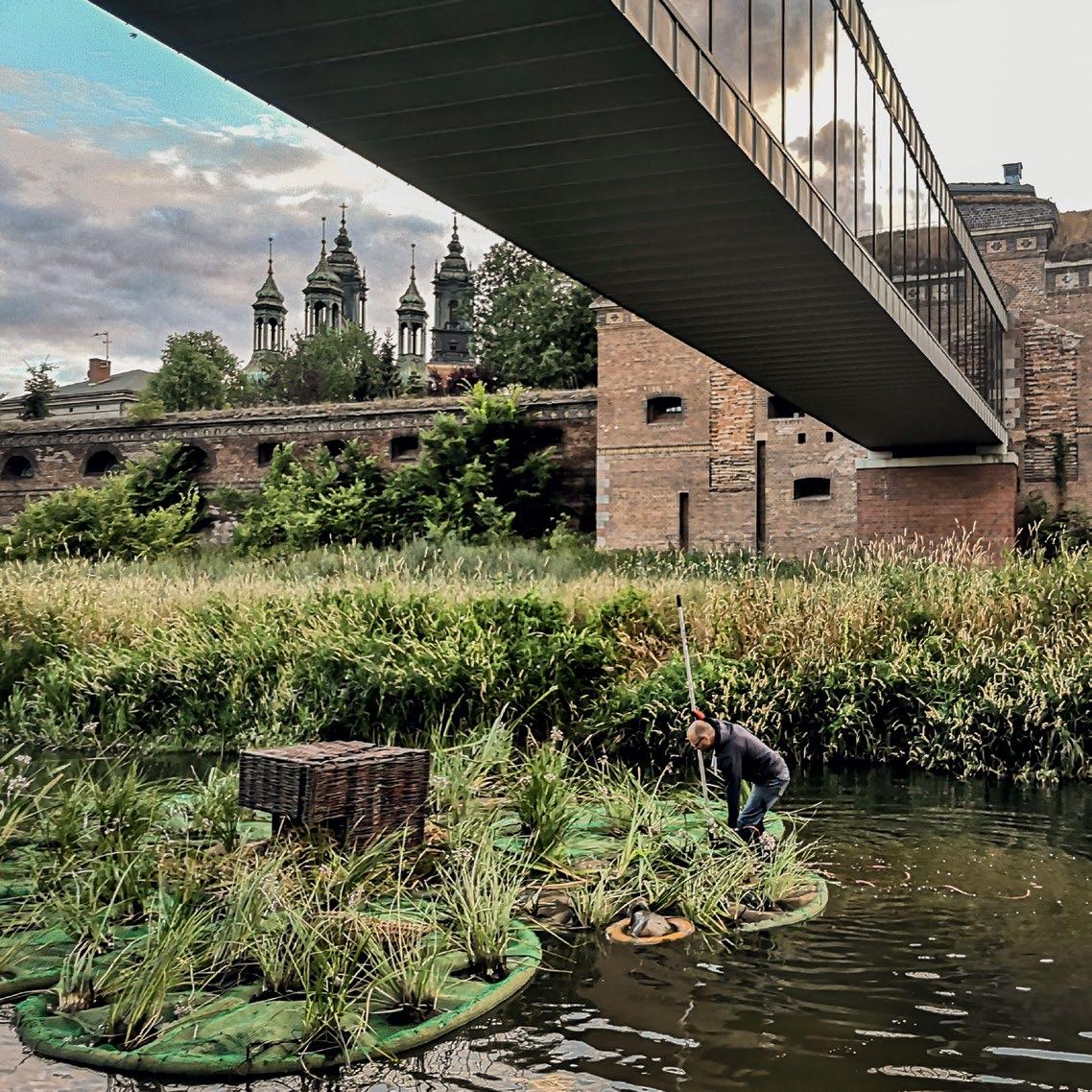
4 minute read
Nature-based solutions in cities
Agnieszka Osipiuk
WILL GREEN WEDGES SUFFICE?
Advertisement
Looking at the map of Poznań, it is easy to distinguish a characteristic wedge-ring green system. The description of the way the wedges work and their benefits constitutes a ready-made idea for an innovative, large-scale project on climate change adaptation. Or it would be, were it not for one tiny fact: today green wedges are hardly new and innovative. They have a long, and not always appreciated, history. For a long time, the wedge-ring system, which was designed in the 1930s by Władysław Czarnecki (in cooperation with professor Adam Wodziczko) has been the most fundamental and precious natural resource in our city. The system is comprised of four main wedges and two rings, which seperate city districts from one another, constituting wide walls of trees and small plants between them as well as providing the city with fresh air and the air with humidity. Over the years, the fact that the wedges are tight and connected to the rings led to the creation of wildlife corridors. They contribute to the exchange of animals and plant species in the city and biodiversity. In the meantime, the development of the city and housing has gradually put the system under pressure, especially in the city centre.
Establishing new parks and urban forests would definitely improve the existing system. However, it is not always possible. How can we, therefore, ensure good quality of life for the inhabitants of Poznań, which is embodied in the access to the green areas, especially when the buildings are put up so close to one another? The answer lies in the small-scale interventions, which are sometimes called urban acupuncture: pocket parks, green walls and roofs, rain gardens and floating gardens, unsealed natural playgrounds, community gardens
and opening access, to a greater or lesser extent, to open gardens belonging to public institutions and private owners.
SMALL-SCALE INITIATIVES… ON A LARGE SCALE
“Integrating various small-scale solutions based on nature (such as pocket parks or community gardens) in the districts where buildings are set up very close to one another will contribute to bringing to life the long-term vision of Poznań as a green city, which can reconcile the high quality of life with sustainable development of infrastructure and fast economic growth of the city” (source: CONNECTING Nature – Synteza badań poszukiwawczych w Poznaniu, Osmos and UAM, 2018). connected to nature-based solutions and the companies which introduce such solutions into their social responsibility strategies. Poznań Enterprise Summit will also be an opportunity to demonstrate other flagship projects such as natural playgrounds and open gardens.
Poznań CONNECTING Nature team, which was created at the Project Coordination and City Revitalisation Office at the Poznań City Council, is responsible for devising, researching and promoting small-scale, nature-based solutions in the city. The team cooperates with other city departments and entities, in particular with Adam Mickiewicz University.
Since 2017, thanks to the aforementioned international cooperation which is co-financed by the Framework Programme Horizon 2020, Poznań has been building natural playgrounds at kindergartens, establishing floating gardens, opening gardens belonging to kindergartens for the inhabitants, and developing an education offer based on the so-called ‘ekodemonstratory’, which are devices, pieces of furniture and other elements in the city made of natural materials. The city has been also searching for alternative sources of funding and financial models which would make it possible not only to introduce some green innovations but also to ensure their long-term operation. Furthermore, the city analyses the local service sector connected to the nature-based solutions and identifies companies and organisations working in this field (NBE – nature-based enterprises).
The epidemiological situation which cities around the world have found themselves in as well as the necessity to isolate draw our attention to such aspects of the nature-based solutions as the accessibility and the size of the public green areas. A new issue of the degree to which the industry of the green and blue infrastructure services can be affected by compulsory isolation and restrictions on the economic activity has also arisen.
In July 2020 Poznań was to host the CONNECTING Nature Poznań Enterprise Summit. Due to the situation in Poland and abroad connected to the coronavirus SARS-CoV-2 epidemic, the event has to be postponed to autumn 2020 or even to 2021. The situation has also put more emphasis on some of the NBS issues. The aim of the Poznań Enterprise Summit is to share experience and the challenges faced by both the representatives of the industries
Porta Posnania, an institution which combines history and cultural and natural heritage, is the partner of the CONNECTING Nature Poznań Enterprise Summit.
In 2019 CONNECTING Nature’s team cooperated with the On Water Foundation and Porta Posnania to build a floating garden. The aim of the garden was to create habitat for animals, filter water and lower the risk of heat stress. The project was accompanied by thematic workshops for families – Floating islands for the Cybina’s fauna. The City of Poznań is working with Porta Posnania on further projects introducing nature-based solutions into the public space.
Agnieszka Osipiuk – Chief Specialist on interdisciplinary projects at the Project Coordination and City Revitalisation Office at the Poznań City Council, coordinator of the Health&Greenspace Project (URBACT III Programme), member of the CONNECTING Nature project team (Horizon 2020). For several years, she has been managing international projects.








